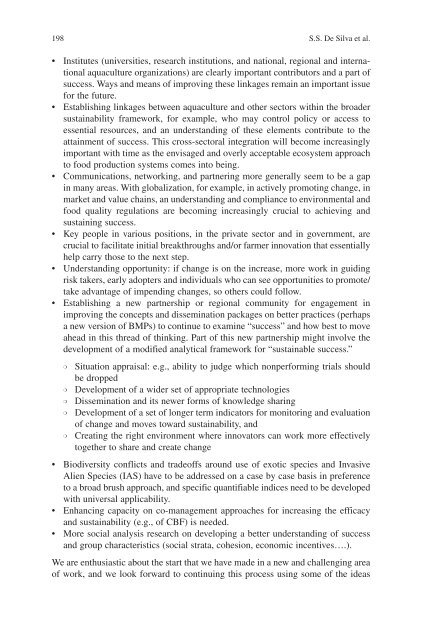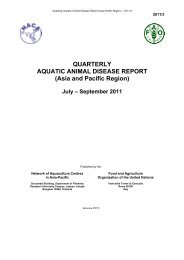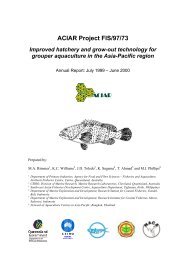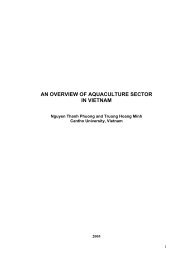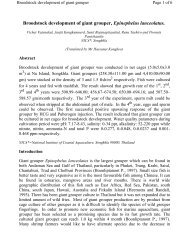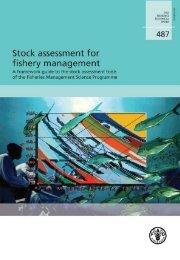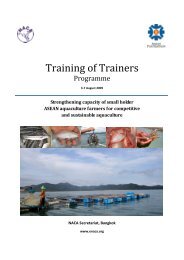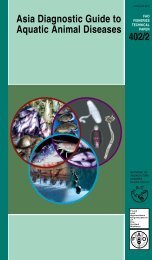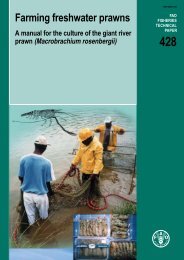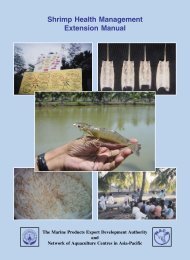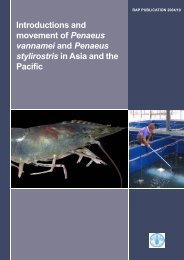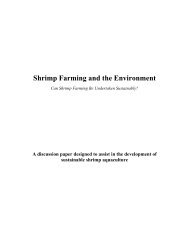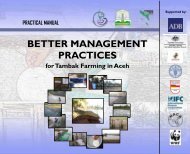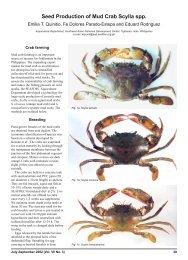Success Stories In Asian Aquaculture - Library - Network of ...
Success Stories In Asian Aquaculture - Library - Network of ...
Success Stories In Asian Aquaculture - Library - Network of ...
- No tags were found...
You also want an ePaper? Increase the reach of your titles
YUMPU automatically turns print PDFs into web optimized ePapers that Google loves.
198 S.S. De Silva et al.• <strong>In</strong>stitutes (universities, research institutions, and national, regional and internationalaquaculture organizations) are clearly important contributors and a part <strong>of</strong>success. Ways and means <strong>of</strong> improving these linkages remain an important issuefor the future.• Establishing linkages between aquaculture and other sectors within the broadersustainability framework, for example, who may control policy or access toessential resources, and an understanding <strong>of</strong> these elements contribute to theattainment <strong>of</strong> success. This cross-sectoral integration will become increasinglyimportant with time as the envisaged and overly acceptable ecosystem approachto food production systems comes into being.• Communications, networking, and partnering more generally seem to be a gapin many areas. With globalization, for example, in actively promoting change, inmarket and value chains, an understanding and compliance to environmental andfood quality regulations are becoming increasingly crucial to achieving andsustaining success.• Key people in various positions, in the private sector and in government, arecrucial to facilitate initial breakthroughs and/or farmer innovation that essentiallyhelp carry those to the next step.• Understanding opportunity: if change is on the increase, more work in guidingrisk takers, early adopters and individuals who can see opportunities to promote/take advantage <strong>of</strong> impending changes, so others could follow.• Establishing a new partnership or regional community for engagement inimproving the concepts and dissemination packages on better practices (perhapsa new version <strong>of</strong> BMPs) to continue to examine “success” and how best to moveahead in this thread <strong>of</strong> thinking. Part <strong>of</strong> this new partnership might involve thedevelopment <strong>of</strong> a modified analytical framework for “sustainable success.”❍ Situation appraisal: e.g., ability to judge which nonperforming trials shouldbe dropped❍ Development <strong>of</strong> a wider set <strong>of</strong> appropriate technologies❍ Dissemination and its newer forms <strong>of</strong> knowledge sharing❍ Development <strong>of</strong> a set <strong>of</strong> longer term indicators for monitoring and evaluation<strong>of</strong> change and moves toward sustainability, and❍ Creating the right environment where innovators can work more effectivelytogether to share and create change• Biodiversity conflicts and trade<strong>of</strong>fs around use <strong>of</strong> exotic species and <strong>In</strong>vasiveAlien Species (IAS) have to be addressed on a case by case basis in preferenceto a broad brush approach, and specific quantifiable indices need to be developedwith universal applicability.• Enhancing capacity on co-management approaches for increasing the efficacyand sustainability (e.g., <strong>of</strong> CBF) is needed.• More social analysis research on developing a better understanding <strong>of</strong> successand group characteristics (social strata, cohesion, economic incentives….).We are enthusiastic about the start that we have made in a new and challenging area<strong>of</strong> work, and we look forward to continuing this process using some <strong>of</strong> the ideas


